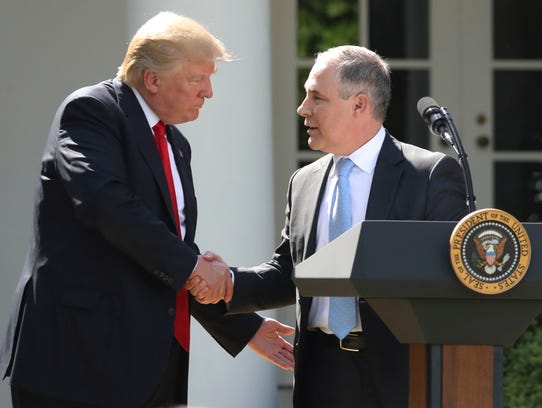
Stalled on health care, President Trump quietly scores wins on energy agenda
WASHINGTON — President Trump had barely settled into the Oval Office back in January when he signed executive orders opening the door for construction of the controversial Dakota Access and Keystone XL pipelines.
He was just getting started.
In the following weeks, the Trump administration lifted a moratorium on coal leasing on federal land; blocked regulations on power-plant carbon emissions; overturned a ban on oil and gas drilling in the Arctic Ocean; delayed rules intended to prevent methane leaks from oil and gas wells; and announced plans for the U.S. to pull out of the Paris climate agreement.
Trump’s promise to repeal and replace the Affordable Care Act suffered a stunning defeat in Congress, and the prospects for his tax-reform pledge are far from certain.
But when it comes to energy policy, the administration has managed to forge ahead on numerous initiatives aimed at not only making the U.S. energy independent but turning it into a dominant energy force.
“These are consequential changes in the sense that they move energy policy in a new direction — essentially a 180-degree turn from where we had been less than a year ago,” said David Konisky, an energy expert at Indiana University’s School of Public and Environmental Affairs.
Much of Trump’s early focus has been on dismantling rules and regulations put in place by former president Barack Obama to protect the environment, fight climate change and make the country less dependent on fossil fuels.
Obama had killed the proposed Keystone XL project, for example, because of environmental concerns raised by the proposed 1,179-mile pipeline stretching from Alberta, Canada to Nebraska. In the final weeks of his administration, Obama also blocked the 1,172-mile-long Dakota Access pipeline from North Dakota to Illinois that had been the subject of heated protests by Native American groups and environmentalists.
Trump has succeeded in moving his energy agenda forward because he has been able to use administrative actions rather than waiting to build consensus in Congress, Konisky said.
Given the partisan divide in Washington, Obama also relied mostly on executive actions to achieve his energy goals instead of looking to Congress to enact them into law. Consequently, Trump is able to roll back Obama’s initiatives, or at least start the process of overturning them, by issuing administrative orders of his own.
But, “we’re still in the very early stages of this,” Konisky said. “One of the things the administration is learning is, although there’s quite a bit of administrative discretion it can use, that discretion is not unchecked.”
Executive actions: Trump signs five more orders on pipelines, steel and environment
Analysis: How will Trump’s coal moves affect the industry?
More coverage: Trump: U.S. will be 'energy dominant'
Trump and Congress: President's agenda still in limbo as GOP looks ahead to fall
The nation’s coal industry, which Trump promised to champion during last year’s presidential campaign, sees the rollback of regulations as a breath of fresh air from the Obama administration, whose policies the industry viewed as antagonistic.
Nationwide, coal production is up about 15% over last year, although it’s hard to gauge how much of that is a result of market forces instead of Trump’s rollback of federal regulations, according to the American Coal Council.
Regardless,“we have been generally very pleased with the trajectory of what has happened in terms of regulatory reform coming from his administration,” said Betsy Monseu, the coal council’s CEO.
Environmental groups and others, however, are challenging many of Trump’s attempts at rolling back Obama-era regulations in court. And the administration already has suffered one legal setback.
Earlier this month, a federal appeals court in Washington ordered the Environmental Protection Agency to enforce an Obama-era rule limiting the amount of methane, a powerful greenhouse gas, that can be emitted from new or modified oil and gas wells.
EPA Administrator Scott Pruitt had sought to delay enforcement of the rule for 90 days and for possibly up to two years. The court said Pruitt and industry groups had not shown that complying with the rule would cause a significant hardship.
The administration can expect other legal challenges as well, said Michael Brune, executive director of the Sierra Club.
“This administration is the biggest threat to the health of our planet,” Brune said. “What Scott Pruitt is doing at the EPA, we see as a great risk to our air and water and climate. Resisting this administration is a top priority for the Sierra Club for now and the foreseeable future.”

https://www.usatoday.com/story/news/politics/2017/08/24/president-trump-energy-agenda/590893001/
